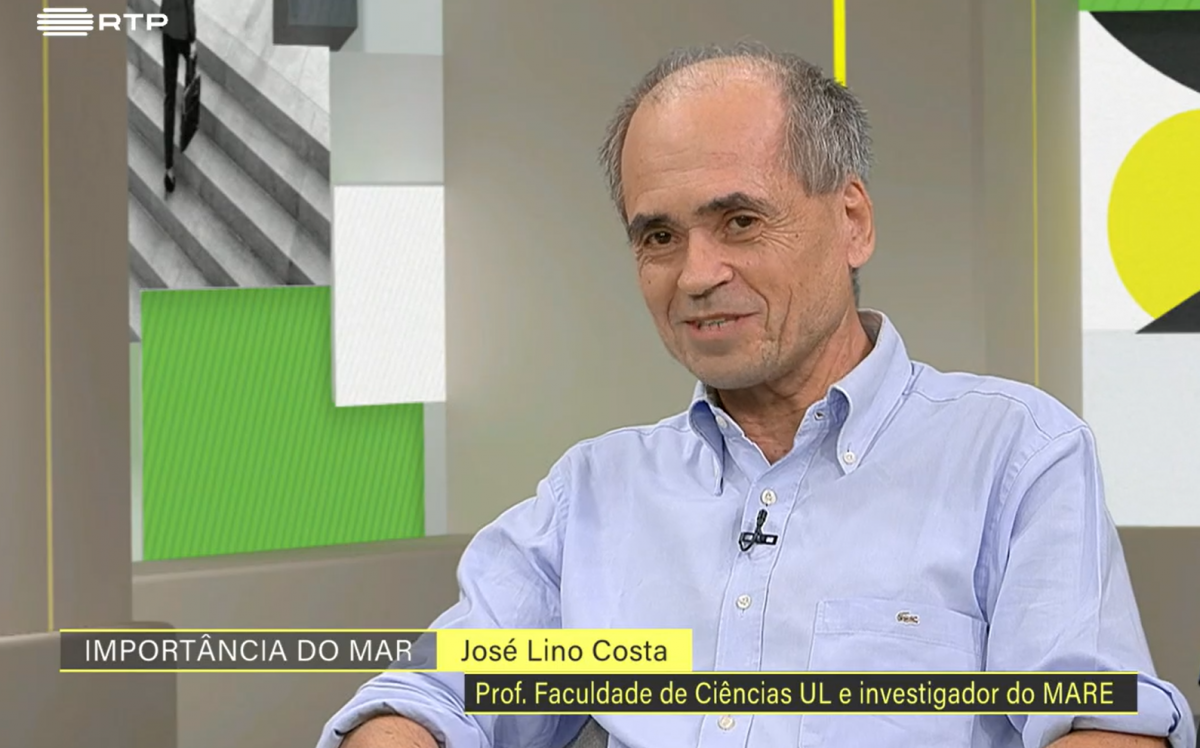The importance of the sea under discussion on the Civil Society programme
Researcher and professor José Lino Costa, from MARE-ULisboa/ARNET at the Faculty of Sciences of the University of Lisbon (CIÊNCIAS), participated in RTP2's Civil Society programme, dedicated to the importance of the sea, where several experts discussed the role of the oceans and the challenges of their protection and sustainable management. 
José Lino Costa highlighted the role of academia in producing scientific knowledge about the sea and the progress achieved in Portugal in recent decades. ‘The Portuguese scientific community produces science and knowledge at the highest level in the world,’ he said, noting that the country ranks highly in international scientific production indicators. He pointed out, however, that the challenge is greater in a country with an extensive maritime area and limited economic resources.
The researcher argued that fundamental and applied science are complementary and that Portugal has the capacity to innovate. He added that it is essential to strengthen the connection between the country and the sea. ‘There is a lot of talk about Portugal as a maritime country, but we need to understand whether this idea is really internalised and whether people are interested in returning to the sea,’ he stressed.
When asked about the role of ocean literacy, he highlighted the awareness-raising work carried out by research centres, NGOs and public bodies, referring to the Blue School Project, WWF-Portugal's educational programmes and MARE goes to school. However, he stressed that ‘A lot of literacy work is being done, but we need to assess whether we are succeeding, whether the message is getting across and sticking.’ He also considers it important to strengthen collaboration between universities and the training of professionals with a broader vision that includes the social and economic dimensions linked to the ocean.
In the second part of the programme, the researcher addressed the blue economy and the challenges of a sector that is still dependent on traditional activities. He explained that these will have to adapt to climate change and that the growth of new sectors, such as offshore aquaculture and marine wind energy, must be accompanied by rigorous environmental management. "We have to do better at sea than we have done on land. There is no incompatibility between conservation and economic development, but it is essential to ensure the sustainability of the ocean," he said.
He also noted that Portugal is among the countries closest to meeting the targets for the creation of marine protected areas, but warned that these are only effective when they have the means and resources. He also considers it necessary to move forward with the restoration of degraded areas and to invest in continuous monitoring of the ocean. ‘The important thing is to ensure data collection over time, as is done in meteorology, to better understand what is happening in the marine environment,’ he said. He highlighted the role of CoastNet, a national coastal observation infrastructure that combines, among other features, direct measurements and remote sensing data, allowing ocean conditions to be monitored and information to be made available in real time. ‘We need to invest more in these systems because it is expensive and difficult, but it is essential for us to have reliable data and be able to move forward.’
The programme also featured Dina Ferreira, manager of the Mar 2030 Programme, who presented public policies and community support for energy transition and sustainability in fisheries; Rita Sá, from WWF Portugal, who highlighted the role of co-management and the participation of fishing communities; Álvaro Garrido, from the University of Coimbra, who addressed the relationship between science, culture and ocean citizenship; Maria Manuel Valagão, researcher and author, who explored the role of the sea in Portuguese food and cultural identity; Nuno Vasco Rodrigues, marine biologist and photographer, who emphasised the importance of science communication and imagery in raising awareness of conservation among civil society as a whole; and Diana Madeira, researcher at the Centre for Environmental and Marine Studies (CESAM), who explained the role of the ocean in climate regulation and the impacts of marine heatwaves on ecosystems and human activities.
The episode reinforced the importance of the sea for life on the planet and the need to unite science, the economy and society in its preservation.
Full episode HERE
Text by Vera Sequeira
